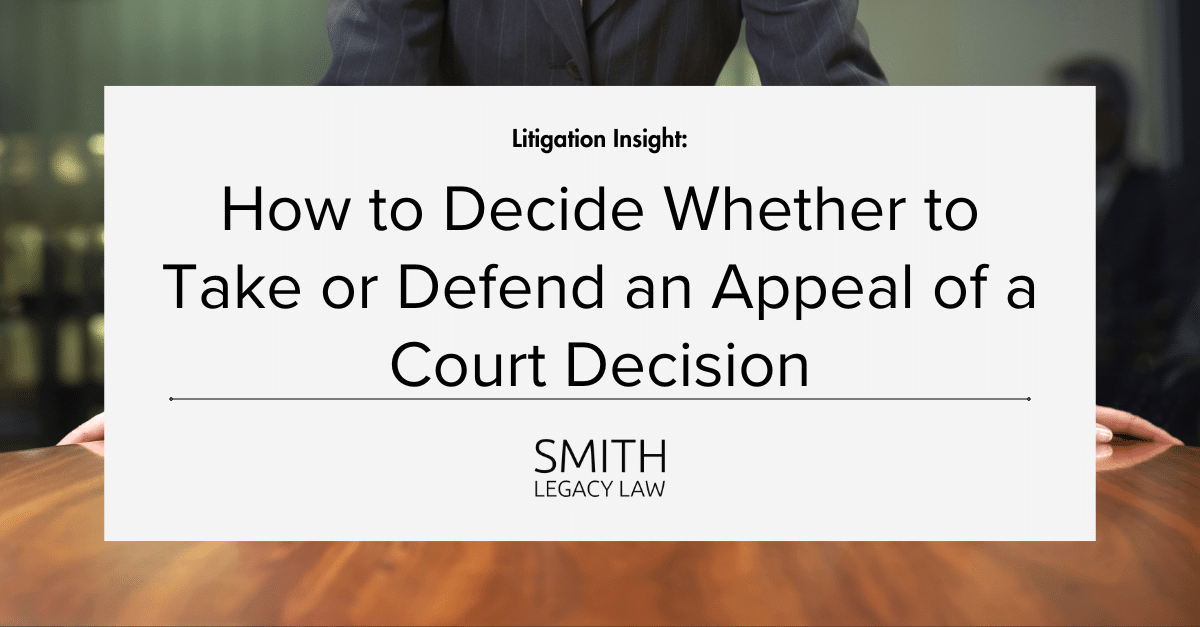In litigation, judges may issue decisions after reviewing motions which can affect the parties and the outcome of the case. These motion decisions can be made while the lawsuit is still pending as well as after a judge issues a final decision on the case. A party who is unhappy with a court’s decision may be able to appeal. However, appeals are subject to strict rules and procedures that govern when and how they are permitted, and these rules vary by state. There are also important practical considerations that should be weighed before deciding whether to take or defend an appeal.
When Can You Appeal a Decision?
An appeal is taken to seek review by a higher court of a judgment, decision, or order from a lower court, usually because a party feels that the lower court made a mistake in the ruling.
Decisions by a court that determine the final outcome of the case are often referred to as final orders. Generally, these are appealable as of right, meaning a party can file the appeal without receiving court permission.
However, there are many orders that a court may issue throughout the proceeding which are not dispositive of the ultimate issue of the case, and therefore not final orders. Such orders are referred to as non-final or interlocutory. Depending on the jurisdiction, non-final or interlocutory orders may also be appealed but may require court permission.
What Are the Steps in an Appeal?
The party initiating the appeal, called the appellant, must file a notice of appeal within a proscribed time period to preserve its right to appeal. After this has been filed, the appellant must then perfect its appeal in a timely manner by filing the appellate record and a brief. The record must be compiled and organized by the appellant and submitted in a specified format. The record typically contains the motions from the lower court, the decision, and any exhibits or evidence submitted in support of the motions. The appellant’s brief will outline the reason for the appeal and the appellant’s arguments.
The other party to the appeal, referred to as the respondent, then files an opposition brief. The appellant might then choose to file a reply brief, rebutting points raised by the respondent.
The respondent may also choose to file a cross-appeal. This can arise when the lower court issues a ruling that negatively affects the respondent.
Either party may make motions during the appeal asking the court to take an action, such as to extend the time to file a brief. A common motion by a respondent is a motion to expand the appellate record, which is used by the respondent to add documents to the record submitted by the appellant that supports the respondent’s arguments. Importantly, the appellate court is limited to considering only facts and information contained in the record.
What Happens to Your Case During an Interlocutory Appeal?
While an interlocutory appeal is pending, the lower court may decide to proceed with the original case while the parties await a decision from the appellate court. This might include continuing with discovery, motion practice, or even a trial proceeding. However, the appellant in such a situation will usually seek a stay of proceedings from the lower court in order to prevent possibly unnecessary litigation, though this is at the discretion of the lower court.
What Factors Should You Consider in Determining Whether to Appeal or Defend an Appeal?
Appeals can be an expensive undertaking. The appellant pays the costs of preparing and filing the appellate record and its brief(s). The respondent pays for its briefs. If there are cross-appeals, the parties share the cost of preparing the appellate record but are responsible for their own fees for their respective briefs. There are also legal fees associated with arguing the case before the appellate court. Finally, the decision might necessitate further proceedings at the trial court, which are an extra cost.
The time and money involved must be weighed against the likelihood of success on appeal. Appeals courts can move very slowly at times, and it could be months or even years before the appeal is decided. Your attorney will review the controlling laws in the jurisdiction and provide an assessment of your chances and discuss the work involved. The more the law and facts weigh in your favor, the more likely an appeal will be a good investment of time and money.
In deciding whether to appeal, defend, or cross-appeal, it is important to consider the merits of a possible settlement. While not always appropriate, settlement can offer some certainty and finality that can be elusive in a judicial setting. Ultimately, you and your attorney should evaluate the case with the goal of finding a resolution that best meets your needs within the bounds of the law.
The attorneys at Smith Legacy Law have extensive experience in multiple appellate jurisdictions and have successfully taken and defended appeals in numerous types of cases, from corporate issues to trust governance. Contact us for a consultation to learn how we can help you with your matter.
